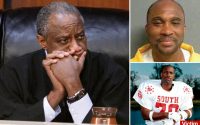Run-DMC, Ghostface Killah say it’s ‘forever’ before Yankee Stadium show
As the future DMC in Run-DMC, a 12-year-old Darryl McDaniels got his first education in hip-hop at St. Pascal Baylon Catholic school in Jamaica, Queens.
“I was in seventh grade, and Billy Morris — who was in the eighth grade — walked into the schoolyard with a flat Panasonic tape recorder that all the kids would use [back when] there were no boomboxes,” DMC, 59, told The Post.
“And he said, ‘Yo, come listen to this!’ He pushed play, I heard a beat … and it was about, like, a minute and 30 seconds of this guy rapping over this little drum beat. We didn’t know what it was, but whatever that was — for me, it was my DNA.”
Hearing the voice of the pioneering ’70s New York DJ Eddie Cheeba over that beat rocked DMC’s world: The Hollis, Queens, native would go on to become part of rap’s first superstar act in Run-DMC, who will headline Hip Hop 50 Live — a star-studded extravaganza celebrating the golden anniversary of the music and the culture — at Yankee Stadium on Friday.
Taking it back to The Bronx — where hip-hop was born at a party where DJ Kool Herc introduced the “breakbeat” for MCs to rap over on Aug. 11, 1973 — it’s a who’s who featuring everyone from OG groundbreakers (Slick Rick, the Sugarhill Gang) and ’90s icons (Nas, Ice Cube) to 21st-century titans (Lil Wayne, T.I.) and, of course, the queens of hip-hop (Eve, Lil Kim, Remy Ma and Trina).

“It’s history,” said Ghostface Killah, a member of the legendary Staten Island squad Wu-Tang Clan, who will perform solo. “You got a lotta greats on that shit, from old to new. You could take this flyer and just save that shit for another 50 years.”
Queens-born Marley Marl — an influential DJ and producer behind the beats for the likes of Roxanne Shante, LL Cool J and Big Daddy Kane — was already spinning in clubs when he discovered hip-hop around 1980.
“I would start hearing these tapes coming from Harlem, from the jam in the park in The Bronx,” said Marley, who will play a special DJ set at the Yankee Stadium concert. “I went and got a crew together. I got seven MCs in Queensbridge. Now I’m playing the breakbeats for the rappers.”

With Grandmaster Flash tapes circulating through Queens, DMC’s older brother Alford encouraged him to get with the burgeoning hip-hop movement.
“He made me sell all my comic books to get two turntables and a microphone,” he said. “I started DJing in my basement first. I was Grandmaster Get High because you didn’t need reefer or alcohol to get intoxicated because I was like, ‘My music will intoxicate you.’ ”
DMC would have another life-changing moment in eighth grade, when his friend Joseph Simmons came over to play basketball and ended up discovering his DJ setup.
“He goes, ‘Oh, my brother is Russell Rush,’ ” he said of Russell Simmons, co-founder of the iconic New York hip-hop label Def Jam Records. “He manages Kurtis Blow, he manages Whodini. And I go by the name of DJ Run.”
And the rest is hip-hop history.

But after Run-DMC — which was rounded out by their late DJ Jam Master Jay — hit it big with their 1984 self-titled debut, 1985’s “King of Rock” and especially 1986’s “Raising Hell,” they still wanted to keep hip-hop true to its community roots on the streets of New York.
“When Run-DMC had the opportunity to open the doors, we left them open for LL to follow, Public Enemy to follow, EPMD, Eric B. & Rakim,” he said. “We saw it as something greater than us.”
And 50 years after it was born in the South Bronx, hip-hop has gone from rocking the block to ruling the world.
“Everybody was like, ‘Rap’s a fad. It’s gonna die like disco. You guys are gonna fade out like the hula hoop,’ ” recalled DMC, who will release the solo single “Kingdom Come” on Aug. 18.
“We had a responsibility to the true pioneers who created this culture, before recorded rap, to make sure that this thing lasts forever.”


